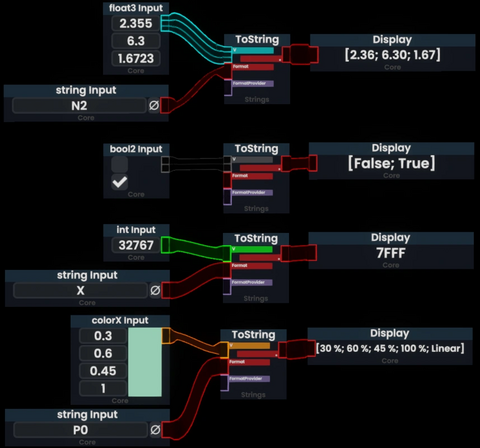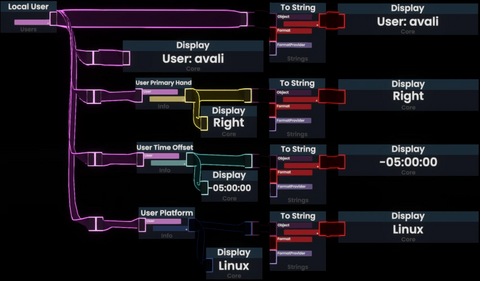m Move category tag |
m YoshBot moved page ProtoFlux:To String to ProtoFlux:ToString: Automated: removing spaces from ProtoFlux namespace |
||
| (5 intermediate revisions by 4 users not shown) | |||
| Line 14: | Line 14: | ||
|}} | |}} | ||
The <code>To String</code> node turns various [[:Category:Type|types]], including objects, into [[Type:String|strings]]. In general, this will match the string that a [[ProtoFlux:Display|display node]] displays. Use cases include HUDs that involve numbers, such as turning your FPS into text for a display, or readouts of objects or values. | |||
== Inputs == | {{Note|If you are looking to take a string and make it into a value instead, try [[ProtoFlux:Parse|Parse]].|suggestion}} | ||
== Inputs == | |||
=== V (Generic) === | === V (Generic) === | ||
The value to turn into a string. | The value to turn into a string. | ||
=== Format (String) === | === Format ([[Type:String|String]]) === | ||
A [https://learn.microsoft.com/en-us/dotnet/standard/base-types/composite-formatting#composite-format-string Composite Format String]. | A [https://learn.microsoft.com/en-us/dotnet/standard/base-types/composite-formatting#composite-format-string Composite Format String]. | ||
=== FormatProvider (IFormatProvider) === | === FormatProvider ([[Type:FormatProvider|IFormatProvider]]) === | ||
The locale to use for the output. Defaults to the invariant culture. | The locale to use for the output. Defaults to the invariant culture. | ||
== Outputs == | == Outputs == | ||
=== * (String) === | === * ([[Type:String|String]]) === | ||
The value as a string following the format. | The value as a string following the format. | ||
Latest revision as of 00:37, 21 August 2025
To String
Strings
The To String node turns various types, including objects, into strings. In general, this will match the string that a display node displays. Use cases include HUDs that involve numbers, such as turning your FPS into text for a display, or readouts of objects or values.
Inputs
V (Generic)
The value to turn into a string.
Format (String)
FormatProvider (IFormatProvider)
The locale to use for the output. Defaults to the invariant culture.
Outputs
* (String)
The value as a string following the format.
Examples
-
Four examples of converting various primitives to string. Three of the examples use Standard Numeric Format Strings.
-
Four examples of converting various objects to string. Note how, in general, the output matches what the display node outputs.

